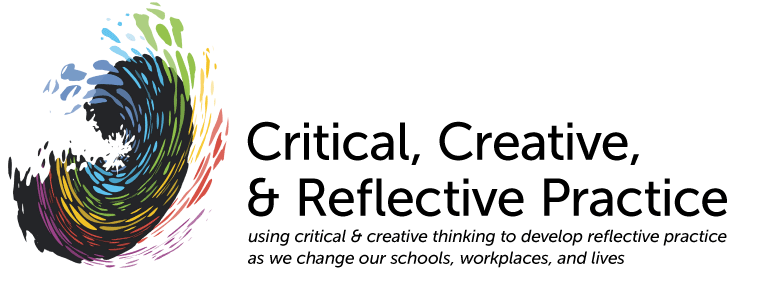Where can reflective practice make a difference?
A Collaborative Exploration (CE) in which participants investigate the ways that promoting reflective practice translates into changes in the world and our lives
- In brief, CEs are an extension of Problem- or Project-Based Learning (PBL) and related approaches to education in which participants address a scenario or case in which the problems are not well defined, shaping their own directions of inquiry and developing their skills as investigators and prospective teachers (in the broadest sense of the word). (For more background, read the prospectus.)
- If you want to know what a CE requires of you, review the expectations and mechanics.
- on hangout for 1 hour each week Thursdays 4-5pm (US EST), September 11, 18, 25 & October 2. The URL for the first hangout will be provided only to those who register (via http://bit.ly/CEApply), which entails making a commitment to attend that 1st session and at least 2 of the other 3 hangouts.
- If you are wondering how to define a meaningful and useful approach to the topic, let us present a scenario for the CE and hope this stimulates you to apply to participate. We will then let CE participants judge for themselves whether their inquiries are relevant.
- Intended outcomes for participants of this CE are of two kinds:
- a) tangible: a compilation or an analysis of what happens (and what doesn't) when reflective practice is promoted (via teaching, workshops, coaching, retreats, etc); and
- b) experiential: being impressed at how much can be learned with a small commitment of time using the CE structure to motivate and connect participants.
"Reflective practice," like "critical thinking" or "creative thinking," seems, at first, like a good thing—After all, who would want to be unreflective? Well, actually, many people, according to
Quiet, by Susan Cain, which depicts the dominance of extroverts—or the extrovert ideal— in a "world that can't stop talking." Suppose, however, like Cain, we want to foster reflection, to coach students, colleagues, and ourselves to establish a mode in which we pause to take stock before leaving one phase/project and moving to a new one, in which we identify alternative paths so we are not simply driven by the context and its changes (Taylor 2012). How do we show the value or effectiveness of that reflection or of our efforts to foster and coach reflective practice?
In an initial search for ideas about evaluating the effect of a workshop on reflective practice, it turns out that reflection or reflective practice is often discussed in close relation to problem-solving (especially analysis of problems that managers face). Success then becomes measurable in terms of problems (re)solved. Suppose we are more interested in "the creation of meaning from past or current events that serves as a guide for future behavior." In that frame, "[r]eflection is the process of stepping back from an experience to ponder, carefully and persistently, its meaning to the self..." These quotes are from a much-cited article of Daudelin (1996), who nevertheless goes on to emphasize problem-solving, not simply meaning-making. How, without shifting from stepping-back reflection to the problem-solving-style reflective practice of managers, can we show the ways that promoting reflective practice translates into changes in the world and our lives?
Even if participants in a workshop or other activity to foster reflective practice feel that the immediate effect is positive, we might ask how that effect can persist when the participants are making their work and lives in a context in which they increasingly have to be entrepeneurial, take charge of making and taking opportunities, generate products (including themselves as employable products)? At the same time, reflection on how we operate in that context can lead us to feel personally responsible for any shortcomings, such as lack of rewarding employment, instead of giving attention to the wider structural conditions that have moved, automated, or otherwise eliminated jobs (Walkerdine 2005).
For these and other reasons that will emerge during the CE, we might benefit from a compilation or an analysis of what happens (and what doesn't) when reflective practice is promoted (via teaching, workshops, coaching, retreats, etc). Certainly, a graduate program that promotes reflective practice, such as
Critical and Creative Thinking at UMass Boston, would benefit from the analyses and syntheses of participants in a CE on this topic.
References
Daudelin, M. W. (1996). "Learning from experience through reflection." Organizational Dynamics 24(3): 36-49.
Taylor, P. J. (2012). "From reflective to redirective to refractive practice." Retrieved 9 June 2104, from
http://wp.me/p1gwfa-sr.
Walkerdine, V. (2005). "Freedom, psychology, and the neo-liberal worker." Soundings: A Journal of Politics and Culture(29): 47-61.
